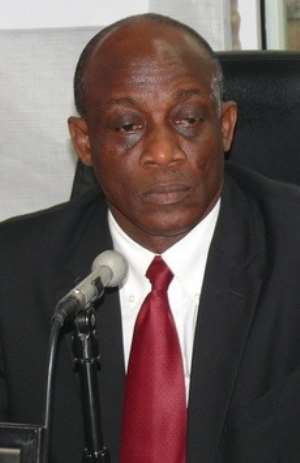
Employers, civil society organisations and labour unions have asked the government to address issues such as electricity and water supply, prices and high interest rates in its 2013 budget to be presented in Parliament today.
Other issues which should engage the attention of the government are infrastructural development and the development of the private sector.
According to some employers, labour unions and civil society organisations, issues such as power supply, water availability and high interest rates constituted challenges facing businesses and entrepreneurship.
In separate interviews conducted by the Daily Graphic in Accra Monday, they said it was crucial for the government to inject substantial resources into those priority areas to resolve the issues for businesses to grow and for the creation of jobs.
Mr Alex Frimpong, the Executive Secretary of the Ghana Employers Association (GEA), the largest association of employers in the private sector, told the Daily Graphic that for the association, tackling the electricity and water crisis, high interest rates and infrastructural development were priority issues.
Making reference to its proposals for the 2013 budget, a copy of which had been given to the Ministry of Finance and Economic Planning (MOFEP), Mr Frimpong said the regularity and reliability of electricity and water supply were challenges for most businesses.
The GEA was also not happy about high interest rates which it said did not reflect the country's improved macroeconomic development, warning that high interest rates by commercial banks were inimical to the competitiveness of local businesses.
It, therefore, asked the government to institute policies to curb the high interest rates and reduce the high cost of borrowing for businesses.
The GEA also urged the government to commit itself to accelerated infrastructural development to open up the country for businesses to be located in all the regions.
For Mr Franklin Cudjoe, the President of IMANI Ghana, a policy think tank, the budget presented a unique opportunity for the government to take bold actions to redress some of the ills of the economy.
For instance, Mr Cudjoe said, the country's deficit of about 12.1 per cent of its gross domestic product (GDP), attributed partly to fuel subsidies and a large wage bill due to the implementation of the Single Spine Pay Policy (SSPP), could be reduced if the implementation of the SSPP was suspended and the money re-directed to support the private sector for jobs and growth.
He argued that the burgeoning wage bill of the country was unsustainable, particularly with the payment of market premiums with no basis to workers, and could railroad the country into a dire situation.
He cited the resoluteness on the part of the government in deciding to take away subsidies, despite public outcry, as an example of the bold actions needed to be taken in respect of capping the wage bill.
In a rebuttal, however, the Secretary General of the TUC, Mr Kofi Asamoah, said suspending the Single Spine Salary Structure (SSSS) was impracticable, as all workers on several different structures had their respective structures abolished and placed on the SSSS, noting that suspending it would create a vacuum no one could handle.
He added that with all the challenges of the SSSS, it instituted control over public sector wages, a privilege the government did not previously have.
The Director of the Labour Research & Policy Institute of the TUC, Mr Kwabena Nyarko Otoo, for his part, reminded all that the government, in its White Paper in November 2009, committed itself to a five-year implementation period of the SSPP, for which reason no such drastic change would be tolerated.
He said issues of salaries were about negotiations underpinned by the labour law.
"Three years into the policy, has anything changed? If it has, then that should be communicated to us," he said.
He said it would be illegal on the part of the government to review anything in the budget in the name of capping the wage bill without discussions and reiterated the position of the TUC that the government had to be transparent on the issue of the wage bill and give details of the component paid to politicians.
For the TUC, a sustainable economy, job creation and dialogue in ironing out issues such as the GH¢9 billion wage bill said to have been paid to public sector workers in wages and the debt of the Tema Oil Refinery were priorities.




 Reintroduce Fiscal Responsibility Act to tackle election budget overrun — Osafo ...
Reintroduce Fiscal Responsibility Act to tackle election budget overrun — Osafo ...
 Flooding: Obey weather warnings – NADMO to general public
Flooding: Obey weather warnings – NADMO to general public
 Fire in NDC over boycott of Ejisu by-election
Fire in NDC over boycott of Ejisu by-election
 NDC to outdoor Prof Jane Naana Opoku-Agyemang as running mate today
NDC to outdoor Prof Jane Naana Opoku-Agyemang as running mate today
 Ejisu: CPP seeks injunction to stop April 30 by-election
Ejisu: CPP seeks injunction to stop April 30 by-election
 Dismiss ECG, GWCL, GACL bosses over losses – United Voices for Change tells gov’...
Dismiss ECG, GWCL, GACL bosses over losses – United Voices for Change tells gov’...
 Submit 2023 audited financial statements by May – Akufo-Addo order SOEs
Submit 2023 audited financial statements by May – Akufo-Addo order SOEs
 Current power outages purely due to mismanagement – Minority
Current power outages purely due to mismanagement – Minority
 ECG hoists red flag to fight Ashanti Regional Minister over arrest of General Ma...
ECG hoists red flag to fight Ashanti Regional Minister over arrest of General Ma...
 Mahama’s 24hr economy will help stabilise the cedi; it’s the best sellable polic...
Mahama’s 24hr economy will help stabilise the cedi; it’s the best sellable polic...
